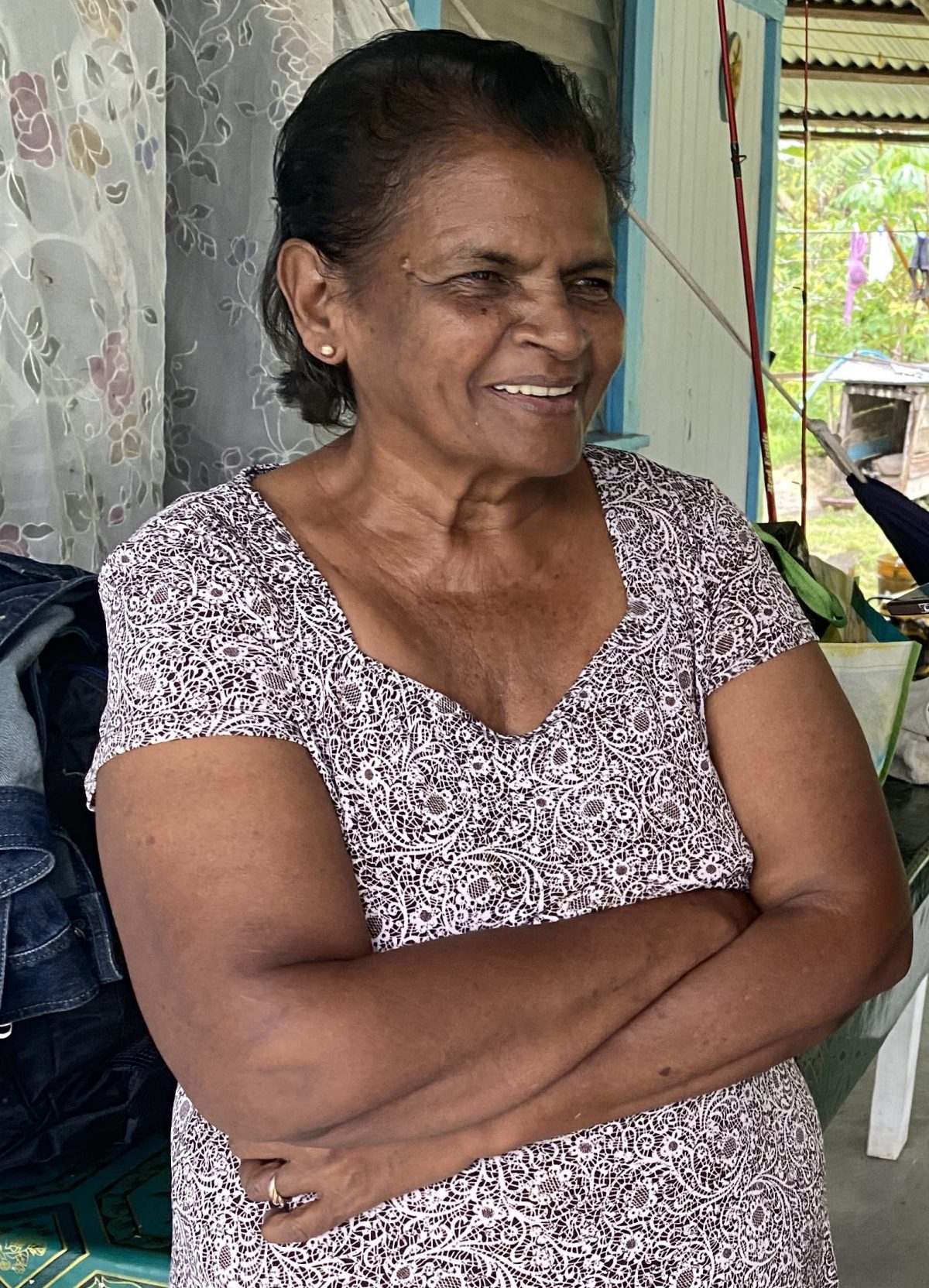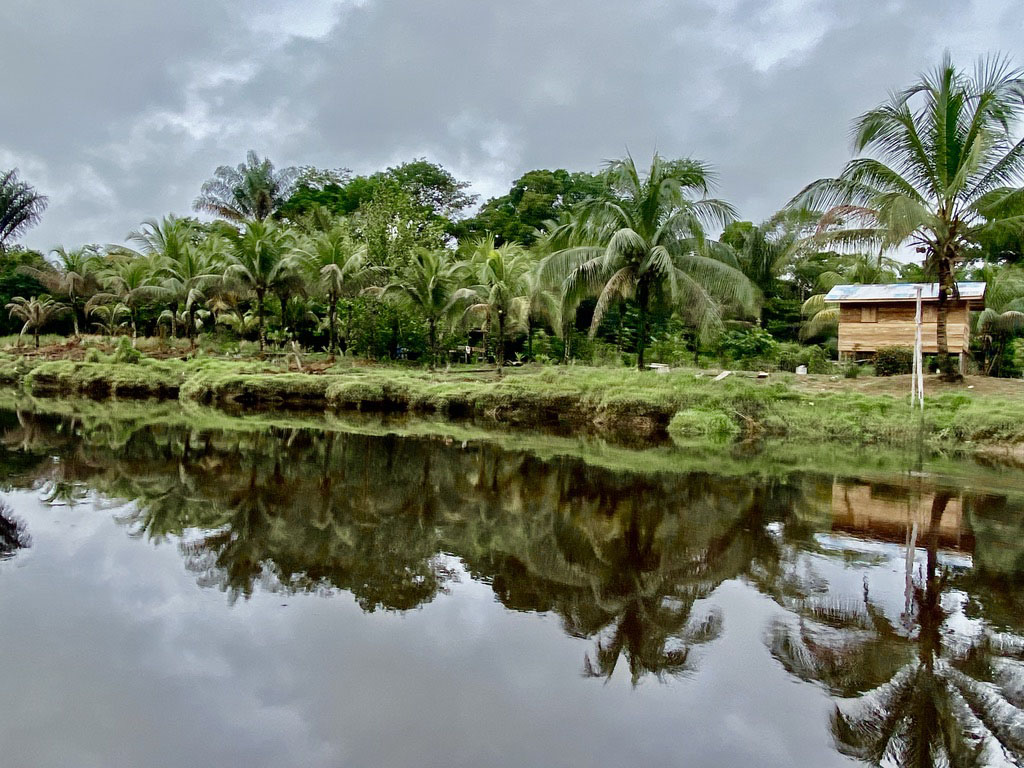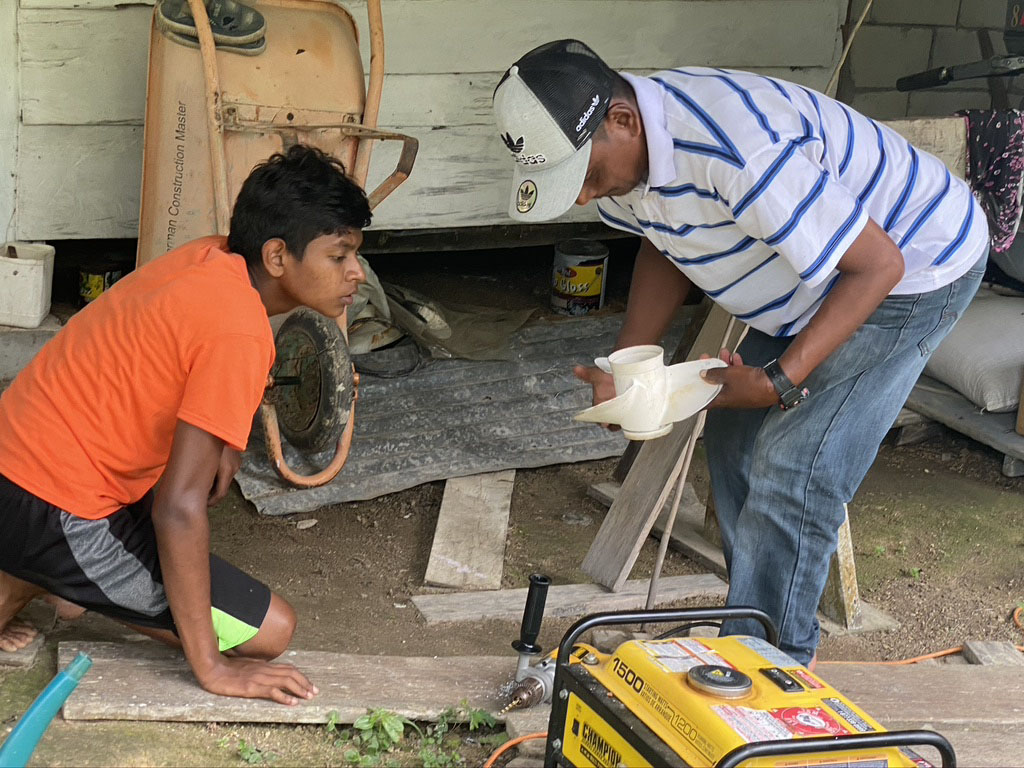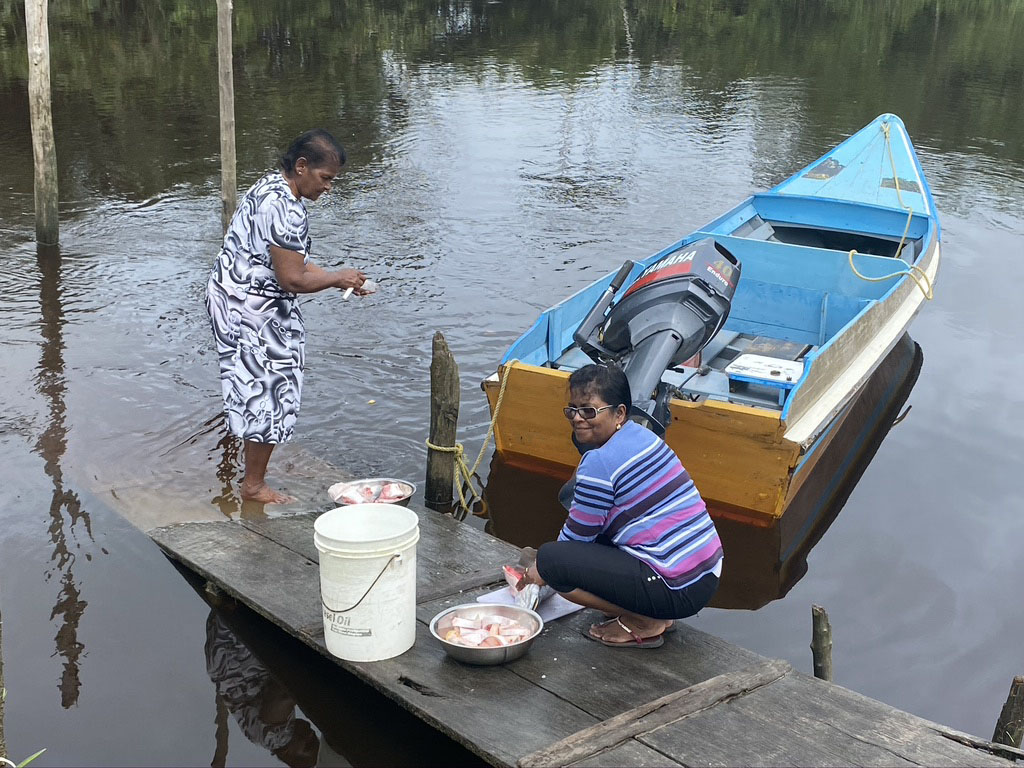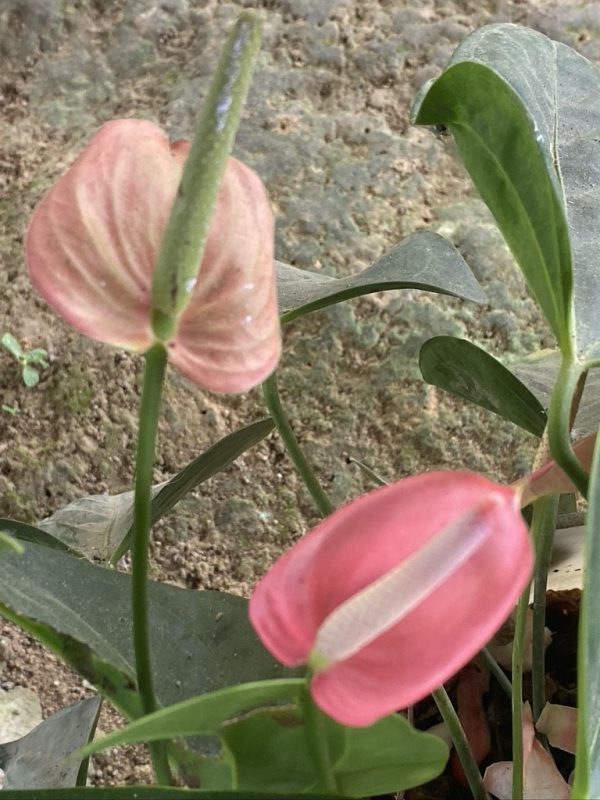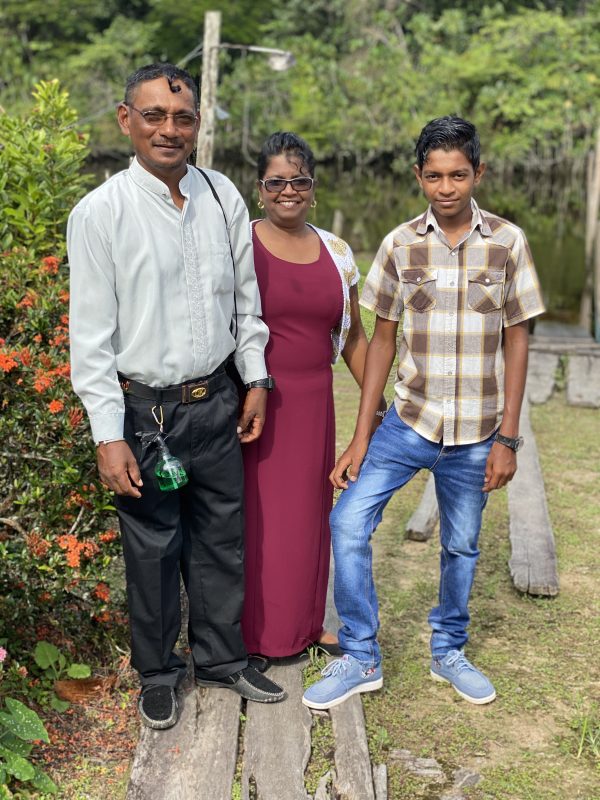The tranquil atmosphere and picturesque scenery in Upper Bonasika Creek, Essequibo River is so captivating that you can easily adapt to the simple life, away from basic utilities.
The different species of trees that line both sides of the smooth blackwater is spectacular and their beauty is enhanced through the full reflection in the mirror-like water.
The speedboat journey from the wharf at St. Lawrence, East Bank Essequibo, took almost one hour.
The boat owner/operator, Nizam ‘Olie’ Hussain, made two brief stops before heading to his home where he hosted us.
Fishing was the highlight of our trip and even though it was just a small catch with some near misses, it was still rewarding and fun.
We also swam at the Grant Landing, trekked through the jungle where logging and sand-mining take place, watched the beautiful macaws flying and screeching overhead and cooked on an outdoor fireside.
A cloudy sky hung overhead, the trees were still and the weather was humid. Later, a heavy downpour followed, resulting in another fishing expedition and a visit to the five-door sluice being cancelled.
Life in the creek is simple and residents seem content. What was striking is the way they take pride in beautifying their yards with flower plants, including orchids, anthurium lilies, ixora and mussaenda.
Fifty houses are scattered along the banks in the farming community and almost every yard is decorated with fruit trees.
The area lacks electricity, potable water and telephone and internet service. But none of that matters when you are away from hustle and bustle and enjoying nature at its best.
For the residents though, life is ‘not a picnic’ and they are eager to have the basic amenities. They feel neglected and lamented that the only time the politicians would visit the area is when it is time to secure votes for elections.
Hussain, who is also a farmer, calls on the authorities to install telephone towers and to supply electricity and solar panels to the community.
“We cannot use phones here. In case of an emergency, we have to go about two miles away or even climb up a tree to get signal. We need internet service too… At least everybody wants to have live internet,” he told this newspaper.
Hussain lamented that “in this day and age of technology, we are left far behind… Students need the internet to do research and it would also be an easier way now for communication.”
Residents do not get to watch local television but they are thankful that they can at least listen to the radio to keep abreast with what’s happening around the country.
Some residents would use a generator for lights for a few hours at nights and to watch movies, their only form of entertainment. They have also invested in small solar panels for a little comfort.
With boats being the only form of transportation, each home has a little landing in front of it. Residents would use the landing to do their laundry and to wash meat and fish and use the water for drinking and cooking. The men, as well as children would bathe in the creek daily.
Typical day
A typical day on his farm for Hussain starts from 7 am and ends at 5 pm. The farm, which occupies 30 to 40 acres of land, is located about a five-minute walk from his home. He takes a lunch break and a brief rest before continuing to farm again.
Presently he cultivates plantain, pumpkin, limes, tangerines, sweet potatoes, watermelon, ginger and cucumbers.
He takes his produce to the Parika stelling bi-weekly or weekly, depending on the availability and vendors would purchase them wholesale.
The prices for the produce “vary… sometimes you enjoy the price but when there is a glut, the prices are really low, beyond your imagination.”
Farmers do not reap the rewards of their hard work as they have to accept whatever prices the vendors pay them.
For instance, he said, “Sometimes we sell one pumpkin for $100, averaging about 25 to 30 pounds. The vendors would get about 10 slices from that and sell each slice for $200.”
They would be paid $25 per pound for plantains at times but at the moment they are enjoying a price of $80 to $90 per pound and according to Hussain, “that’s reasonable.” It is retailed for about $150 to $170 per pound.
“The price for a bag of 400 limes was just $1000 but now the price has increased to $6000 per bag or $15 each.”
Right now limes are on high demand and the farmers do not have the amount to supply the market.
He believes that it is because everyone is making an effort to boost their immune system to fight the novel coronavirus disease (COVID-19).
“When the pandemic just broke out the limes were selling like hot cakes…,” he lamented. “Ginger is also selling a lot too and right now the price is $160. But the price might increase to $240 [wholesale] for the Christmas season.”
His wife, Sharon has her own business, cultivating ‘seasoning’ peppers, which has a high demand in the market because of its high scent and flavour.
Linus, their 13-year-old son who has not attended school after sitting the Grade 6 exams, assists on the farm sometimes.
Linus would have preferred to attend school instead of being at home, but the area does not have a secondary school.
Students find it inconvenient to stay on the coast with friends or relatives to attend school. Some only make it to stay for the first term while others, like Linus, never had the opportunity.
Hussain said the government should look at establishing a secondary department and that about 25 students would benefit.
Despite being a school dropout, Linus has proven to be very skilful. He assists his father to repair the boat engine whenever it encounters problems.
An active member of the church, he would also play the keyboard and sing during the Sunday service. Sadly he was not able to play for a few months now after his keyboard stopped working. His family cannot afford a new one.
Hussain currently serves as the pastor of the church while Sharon teaches Bible studies.
The church used to be packed but now members are adhering to COVID-19 guidelines. A small group of worshippers would take turns to attend the weekly service.
Alice Zephania, Hussain’s mother-in-law, owns 70 acres of land in the creek, including his 30-acre farmland. She reared livestock but had to discontinue because the “bats were killing them out.”
The area has shops but some of the items cost “double the price…” Most of the residents would prefer to do their shopping at Parika when they go there to take their produce.
She and her siblings were little when her parents moved to Upper Bonsasika Creek from the West Coast of Demerara to engage in farming.
They grew to love the area, which she said is “still safe… We don’t have to worry, we can sleep with the windows open.”
Life has been just as simple but she dreams of seeing the area develop with all basic amenities.
She said the politicians, ”forget about us in the creek. It’s like we never exist… We need so many things but we don’t have any representative… Nobody to push for these developments to take place.”
She is pleading with the new government to visit the area to listen to their concerns so they can move ahead with progress around the country.
